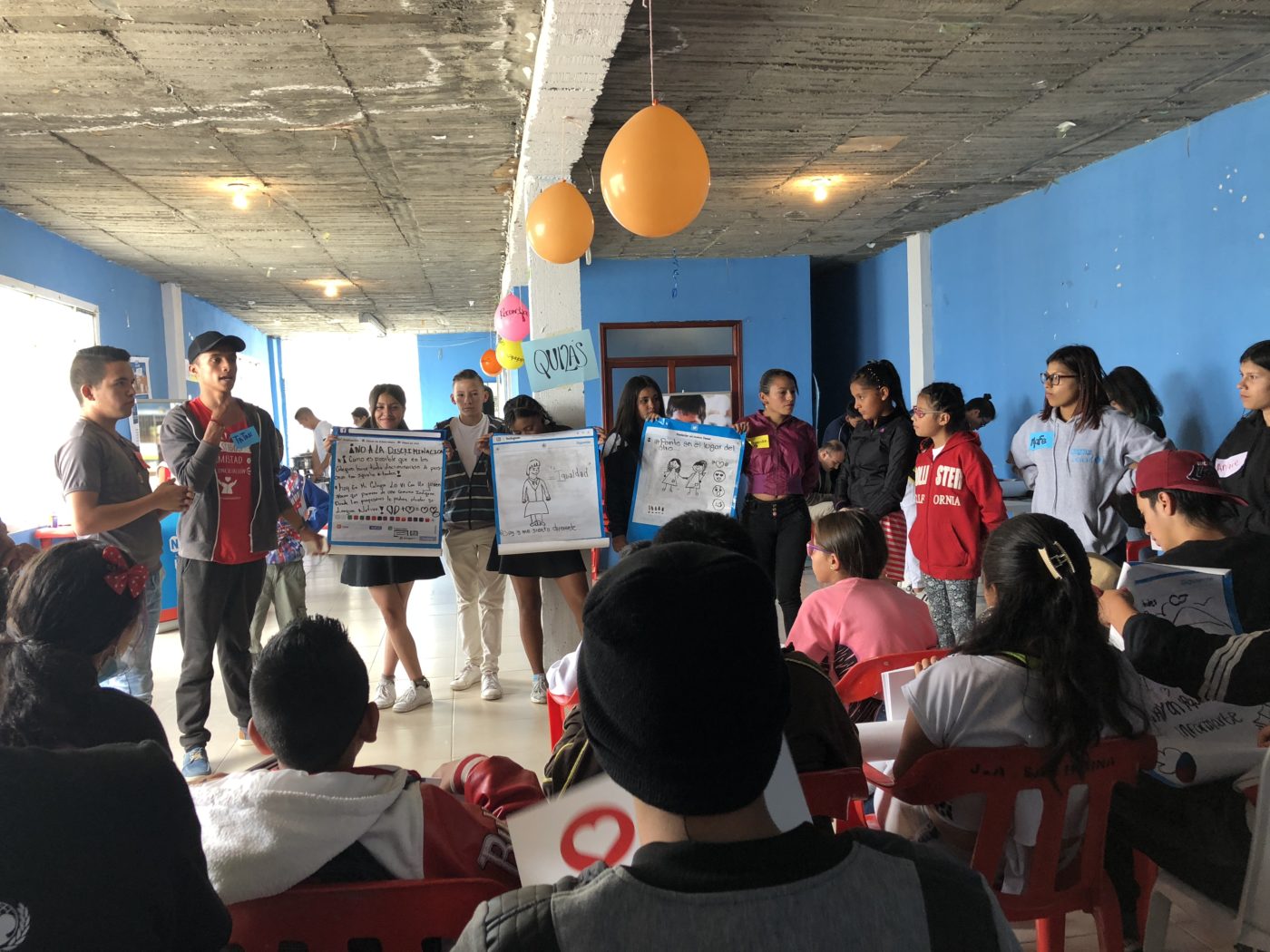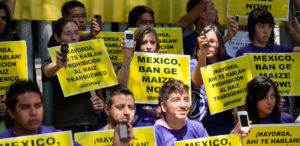Two years ago, UNICEF leadership realised it had a problem: it wasn’t achieving impact commensurate with running programmes in 190 countries.
“As senior leadership was taking stock of the progress we’d made at this point in time for children, the sense was that if we continued to operate as we have, we weren’t going to meet our targets,” said David Ponet, chief of the Global Volunteering Office (GVO) at UNICEF’s New York City headquarters.
At the same time, they saw an opportunity. Around the world, grassroots organisations were tapping into people power using new digital-driven, decentralised tactics. Could UNICEF leverage people power to scale its work and impact around the world? More to the point, can a global organisation that has long relied on an entrenched hierarchical structure open up its goals and work to measurably increase its ability to improve children’s protection, rights and empowerment?
“More than ever before, we’re seeing people self-organising and participating in the mission of organisations like UNICEF,” said Ponet. “We needed to tap into this social power somehow.”
With this in mind, UNICEF, led by the GVO, has undertaken an ambitious project to greatly expand its work with volunteers to meet program goals across the world.
Volunteerism was not central to UNICEF’s work until recently. UNICEF primarily collaborates with governments or contracted NGOs, not members of target communities. Moreover, UNICEF had not, in a coordinated manner, engaged volunteers or focused on incorporating people power into the organisation, aside from engaging people as donors and on social media.
“Volunteer engagement was happening in small pockets, but there was never a focused, concerted organisation-wide effort to build it out and harness that power,” said Ponet.
In 2017, GVO began to fund, catalyse, and empower country offices to create volunteer programs and build people power. Today, GVO works in 35 country offices around the world and has dramatically transformed how countries engage with communities. In places like India, South Africa, Kyrgyzstan, and the Philippines, program staff are working with volunteers to, among other things, reduce violence against children, increase school attendance, train youth on disaster preparedness, and much more.
“Going into this, I did not know what type of reception we would get in country offices,” said Ponet. “There’s been widespread receptivity. People have found working with volunteers energising, and it’s bringing UNICEF closer to the work in the field.”
Localisation is key
The team decided that a one size fits all approach to volunteer programs wasn’t going to work. UNICEF works in diverse country contexts that needed to be recognised and valued if volunteer programs were to work.
UNICEF leadership was inspired by the work MobLab had done to decentralise campaigning at Greenpeace. So MobLab worked with UNICEF to develop a workshop for country offices that borrowed from the Campaign Accelerator model, and has helped advise on overall strategic approach.
“The workshop utilises human-centred design principles and employs participatory exercises,” said Ponet. Key to that, where possible, is to bring in volunteers right at the beginning. “We spend a lot of time engaging with target audiences to get feedback from them and to build concepts in real time.”
Colombia was one of the first countries to work with the GVO. Staff there were given freedom by GVO to decide how best to use limited resources.
“The people from GVO came to Colombia, and they did a workshop with the whole office,” said Maria Camila Villar Guhl with UNICEF Colombia. “We decided that we should work with young people who were formerly part of UNICEF programs, because they already knew about children’s rights.”

Following the GVO workshop in Bogota, UNICEF Colombia worked with volunteer groups to implement similar design workshops around the country, like this one in Soacha. Photo Credit: Shai Naides, UNICEF. Used with permission.
The workshop is just the start, as GVO continues to engage with country offices. The GVO also creates opportunities for various country offices to share with one another. Anahit Minassian at found this useful in helping build their program for UNICEF India.
“Some of the examples that were shared were crucial in opening and widening the horizon of our office and also state offices,” said Minassian. “It was also important and comforting for colleagues and governmental partners.”
Shifting cultures and mindsets
The benefits of volunteerism may seem obvious, but many program staff were hesitant to commit scarce time and resources to building a volunteer program. Others were fearful of letting unaccountable volunteers represent UNICEF. So when Aijan Abdesova with UNICEF Kyrgyzstan began to work on the first concept note for their volunteer program in mid 2018, getting staff on board was difficult.
“At the beginning, the concept note was a disaster. Some colleagues ignored the potential benefits of volunteerism,” said Abdesova. So they began small, working on a single project with the one program officer who was open to volunteer engagement, focusing on engaging volunteers around disaster risk reduction.
South Africa faced a similar challenge, according to Amir Hossein Bagherioromi, who was tasked with managing the country’s volunteer program.
“Initially, program chiefs were hesitant to engage volunteers,” said Bagherioromi. This was partly why the initial focus there was on university students. Existing student groups, including University Student Development Units, can give financial support to groups that demonstrate positive impact on well-being. Today, over 2,000 volunteers are associated with UNICEF South Africa through 12 volunteer groups.
The local context in some countries made it easier to start volunteer programs. Rwanda, for example, is a relatively small country office. The country also has a culture of volunteerism that made it easier for staff to embrace trying something new. GVO brought a new level of strategic thinking and coordination to volunteering at UNICEF Rwanda.
“When we reached out to our programs, they were doing volunteer work here and there – so it was easy to sell the idea,” said Rajat Madhok at UNICEF Rwanda. “We did not create a new volunteer project that was outside what was happening in UNICEF Rwanda, we integrated it within existing programs including child protection and education.”
On the other side of the spectrum is India, one of the largest UNICEF country operations, with a national office and 14 field offices across the country. There, the office decided to partner with existing, state government-run volunteer platforms.
“Rather than engaging with different groups and organisations, we decided we should partner with these platforms, but focus on the states where they’re open to cooperate with UNICEF and open to work on our strategic topics,” said Minassian.

UNICEF India Volunteers campaign to end child marriage using street theatre. Photo credit: UNICEF India. Used with permission.
GVO also made it possible for country offices to regularly learn from one another. Country offices can share approaches, tactics, and foster creative thinking.
Sometimes, all it takes to shift mindsets is to witness impact. It was a challenge for Abdesova to get interest in the first volunteer program. But a year later, other teams have joined and now volunteerism is an active part of UNICEF Kyrgyzstan’s immunisation and child friendly cities campaigns.
“Now we have support and even demand from many programme colleagues,” said Abdesova. “Soon we have to conceptualise a new concept note for the next year, and it will have more support… because they know the capacity of the volunteers now.”

UNICEF Kyrgyzstan volunteers conducting disaster response and readiness trainings in schools and communities. Photo credit: UNICEF Kyrgyzstan. Used with permission.
Measuring impact and growing the brand
The initial hesitation that some program staff had towards creating a volunteer program has disappeared in most offices. Many offices are now seeing programs coming to coordinators looking for help integrating volunteers into their work.
In some places, volunteerism has directly impacted UNICEF’s standing in the country. In Kyrgyzstan, UNICEF had relatively low name recognition in the country, especially outside urban areas. Now, the organisation is known wide and far, thanks to volunteers.
“In very far regions of the country, they know about UNICEF,” said Abdesova. “Nowadays we are everywhere. There is increased awareness of UNICEF’s work and what we do, thanks to the volunteers.”
It is a similar story in South Africa. “Our brand recognition increased enormously,” said Bagherioromi, who believes that the work volunteers have done is key to that.
In Rwanda, the impact is more tangible. Over 1,200 kids have re-enrolled in school due to volunteer-led outreach programs in communities with high levels of school dropouts.

Photo of award ceremony for UNICEF volunteers in Rwanda. Photo credit: UNICEF Rwanda. Used with permission.
Meanwhile, in the Philippines, over 500 youth volunteers participated in a youth convention aimed at showcasing UNICEF and partner organisation volunteers activities. The country office hopes to build on this programme.
“Volunteers want to learn, want to be well equipped when they do their work, and they want to do meaningful work,” said Milette Belen, UNICEF Philippines Volunteer Program Manager. “You have to support them with trainings and keep them updated on what you are doing with your programmes.”
Globally, the change has been remarkable. GVO’s original goal was to work with 30 countries in two years. They hit that goal halfway into their second year, and have now held workshops and helped start volunteer programmes in 35 countries. Skepticism and challenge from country offices has, in a very short time frame, turned into opportunity.
“We got overwhelmed,” said Ponet. “Our team is small, and our resources are finite. We reached a point where we could not keep up with demand. We had to slow down the pace at which we service country offices.”

Group Photo of UNICEF Volunteer Initiative Global Skillshare, Antequera, Spain, June 2019. Photo Credit: UNICEF GVO. Used with permission.
The ideal future, the GVO team tells us, is one where they play a minimal role and volunteerism is built into UNICEF’s core. For now, though, the team will continue to foster and enable more offices to bring people power into their work and encourage them to expand and grow their impact.
“I would love to see volunteer engagement becoming a pillar of how UNICEF engages in public advocacy campaigns, and see a vibrant community of practice where colleagues are sharing insights, stories, and advice with each other,” said Ponet.
Editor’s Note: MobLab has worked closely as a paid advisor to the Global Volunteering Office, profiled in this article, since mid-2017.
Top photo: Following the GVO workshop in Bogota, UNICEF Colombia worked with volunteer groups to implement similar design workshops around the country, like this one in Soacha. Photo Credit: Shai Naides, UNICEF.




